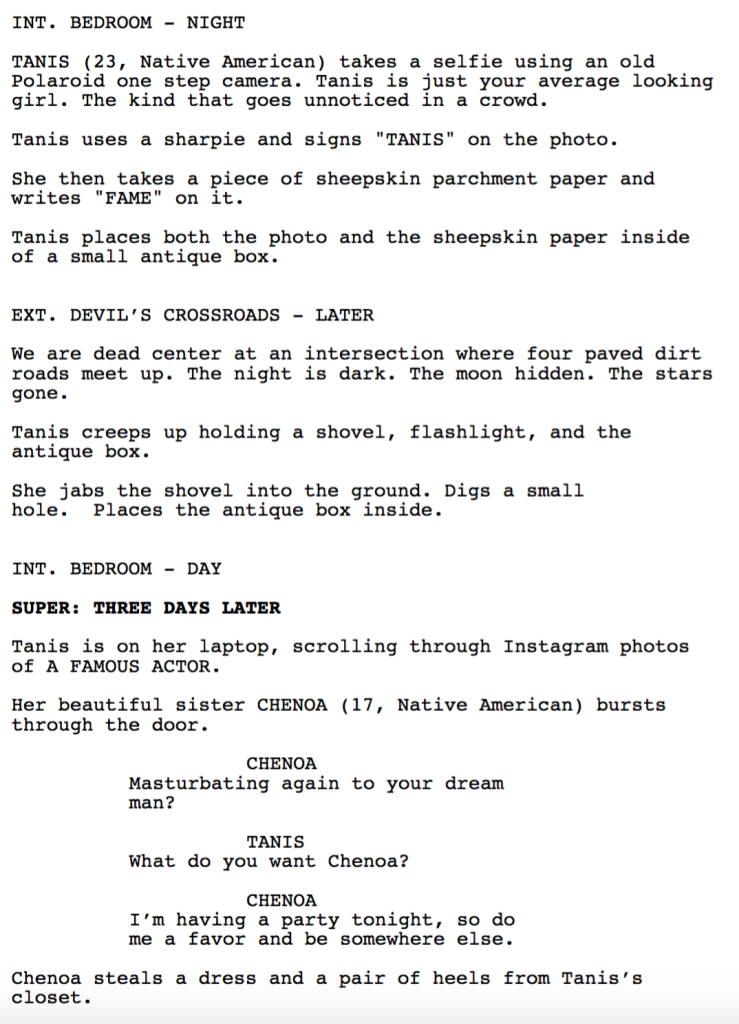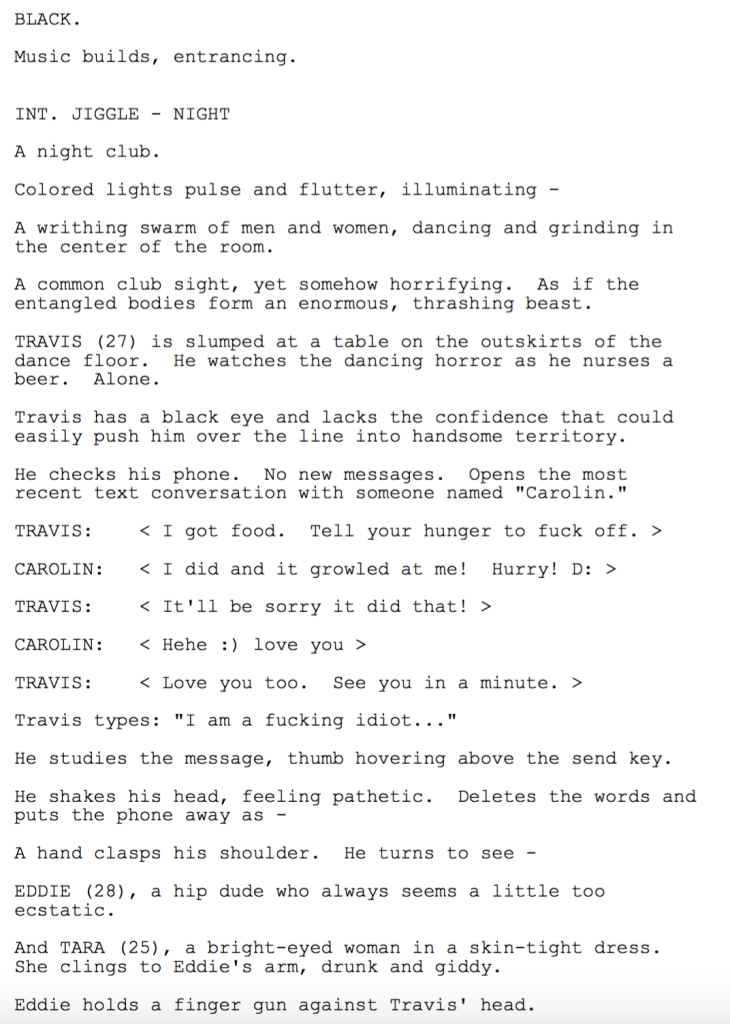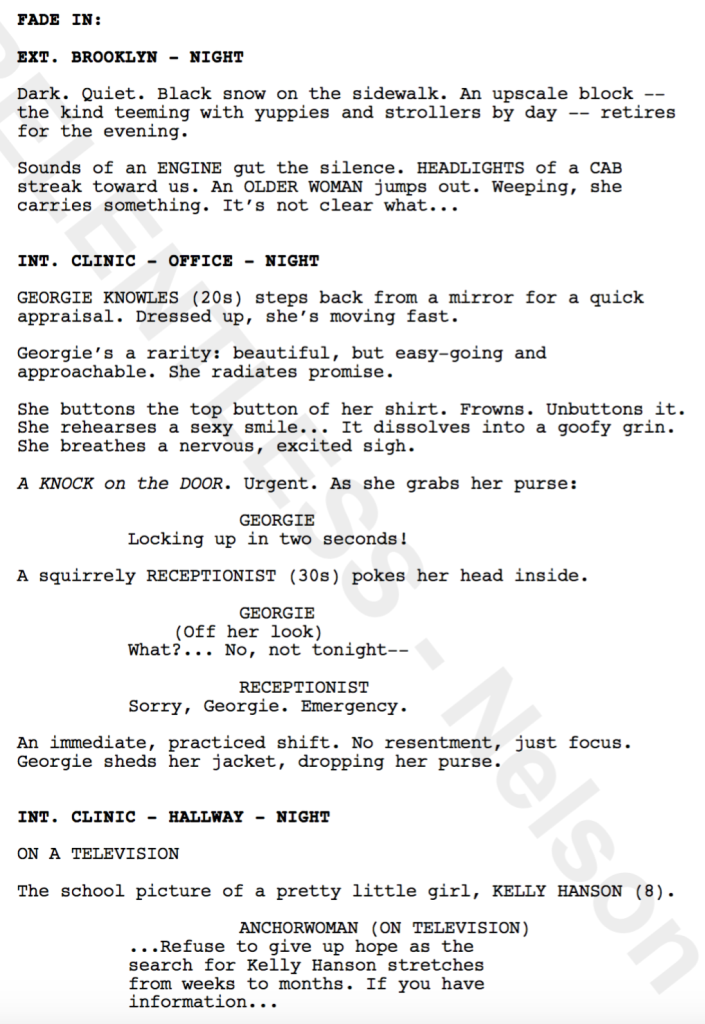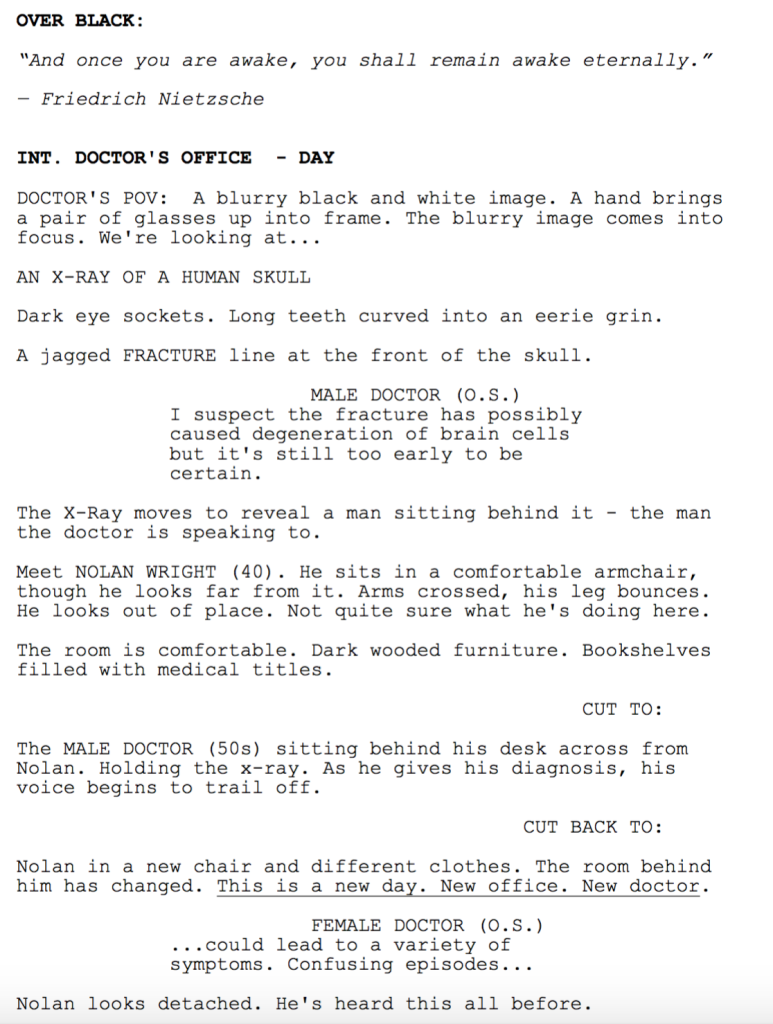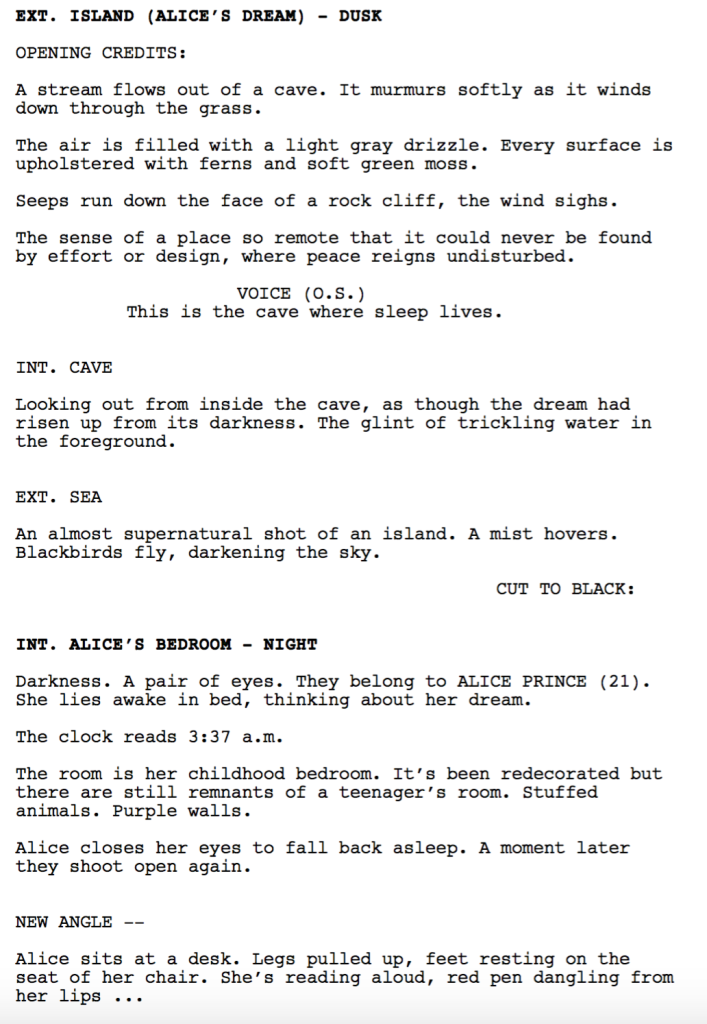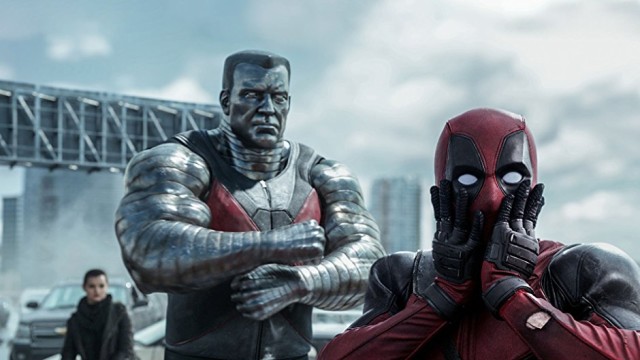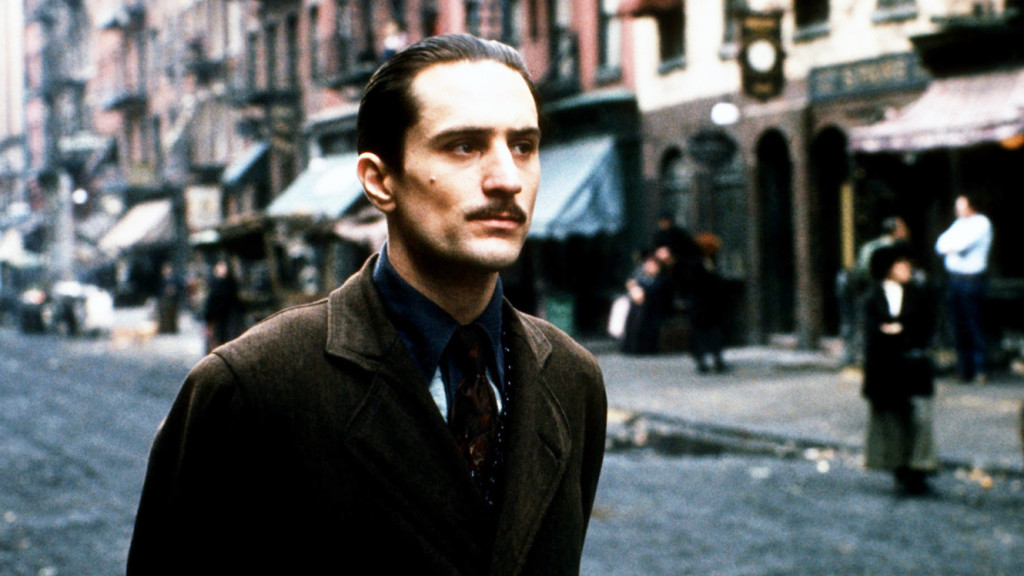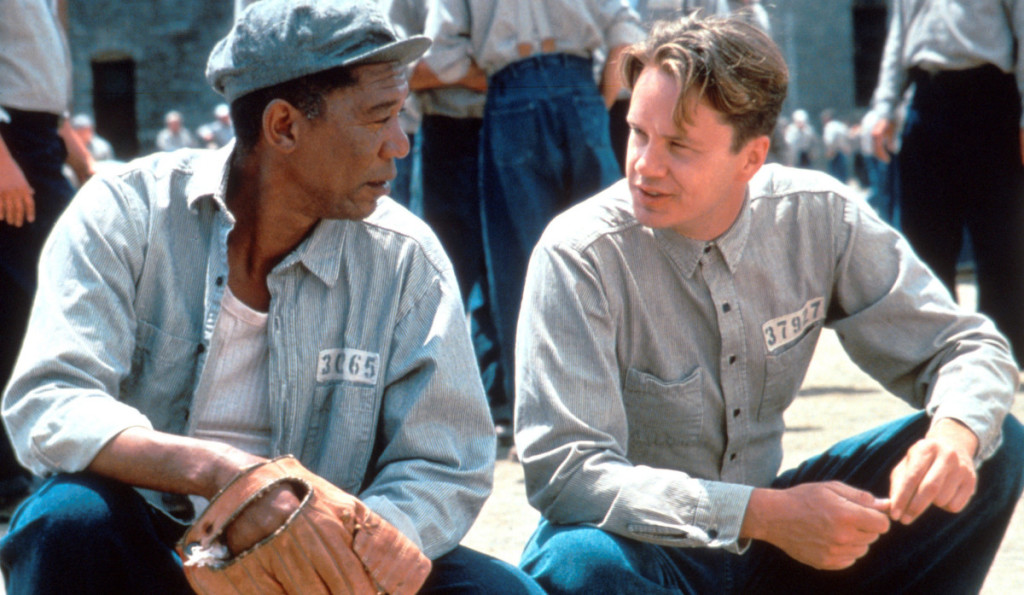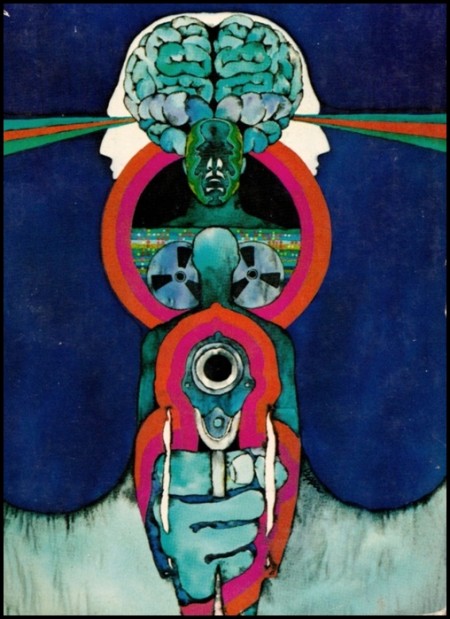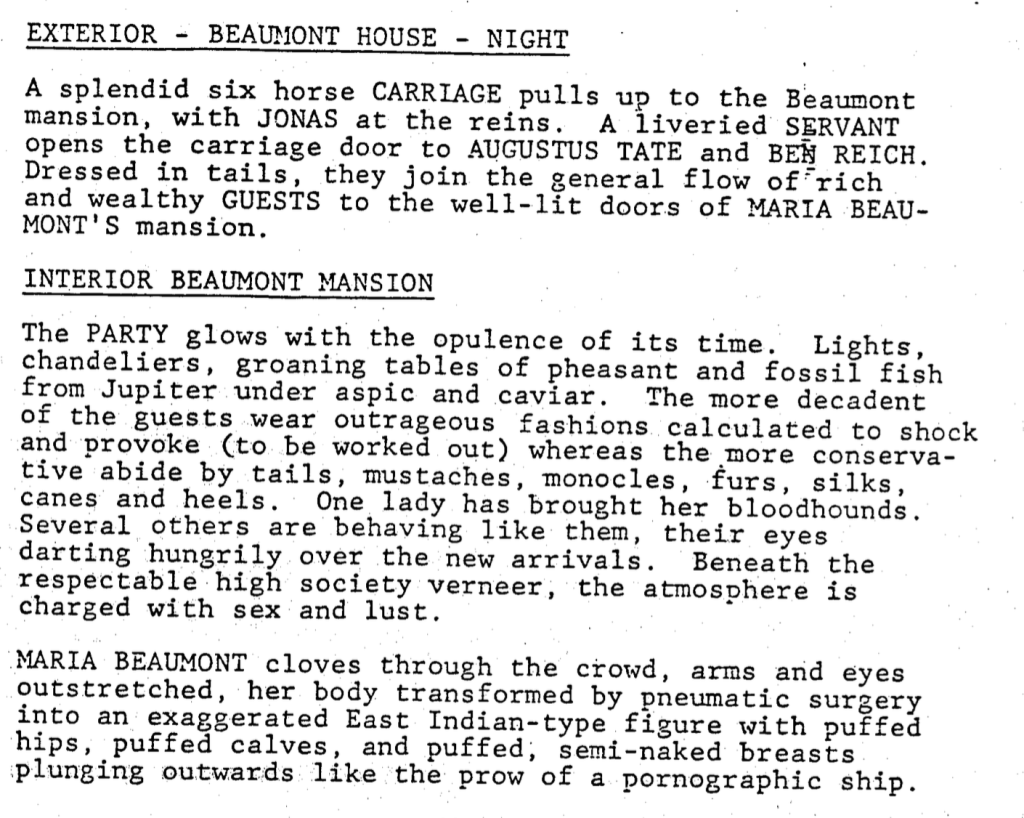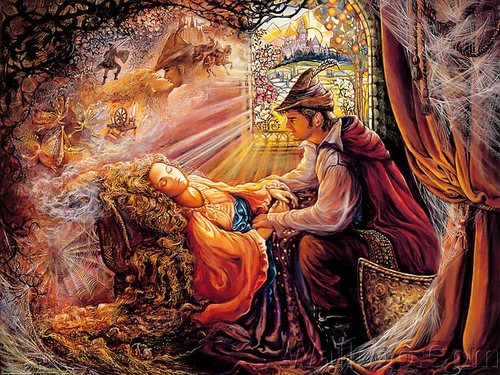What are you going to do this weekend? You could spend 15 hard-earned bucks on Geostorm or The Snowman, the investment equivalent of buying snow tires in Los Angeles, or you could read through this weekend’s Amateur Horror Offerings and vote for your favorite!
In my opinion, one of these entries stands out from the pack. Based on my years of experience, I’m going to bet that just from the way the submission was written, it’s going to win. Since I don’t want to influence votes, I’ll wait until Sunday night to post which entry I’m referring to (I’ll “feature” the comment up top, so it’s easy to see). In the meantime, start downloading and begin reading. Let’s find ourselves a great horror script! Ooooh-oooh-ah-ah-AHHHHHHHH!
How to play Amateur Offerings: Read as much of each script as you can and submit your winning vote in the comments section. Votes will be counted through Sunday, 11:59pm Pacific Time. Winner gets a script review next Friday!
Title: The Pact
Logline: A music journalist becomes the target of a nefarious secret society when she tries to save the soul of a musician who made a deal with the devil.
Genre: Horror
Why You Should Read: How far would you go to have the life you always wanted? To have the life you feel you deserved? We are all born with strengths and weaknesses. Some of us are able to overcome those weaknesses. Others…aren’t so fortunate. As a writer, I often wonder what I would be wiling to do to achieve my own dreams. Would I sell my soul in exchange for the good life? Would you? Musicians selling their souls to the devil, and joining secret societies like the Illuminati is one of the biggest conspiracy theories out there right now. As farfetched and scary as it may seem, sometimes you can’t help but wonder…is it all true? If you ever asked yourself these questions, or if you just fancy a good scare, “The Pact” might just be for you. Happy Halloween!
Title: When the Wilted Bloom
Logline: A man reluctantly brings a beautiful stranger to his apartment in an effort to take his mind off a recent breakup and quickly learns this woman is not interested in giving him a good time. Not in the least.
Genre: Horror/Mystery
Why You Should Read: I’ve been practicing screenwriting off and on for the last six years, and only recently have I decided to buckle down and make a habit of it. I’ve written four feature-length scripts. I was somewhat proud of the first script, the second was a travesty, and the third was a convoluted mess that strayed too far from its intended genre. This brings me to the fourth script. This bastard. I started with the idea of a one-night stand gone horribly wrong and pecked at the keyboard until something gave. Eight drafts later, this is what I got. I’d greatly appreciate if you could read the first five or ten pages at the very least. Laud it or tear it to fucking bits, the members of this site give such wonderful feedback that it’ll be to my advantage, either way. Thanks, guys.
Title: RELENTLESS
Genre: Horror/Thriller
Logline: After seeking refuge at an isolated retreat, a troubled young woman must fight for her life when she’s hunted by ruthless killers and forced to face the nightmare she was trying to escape.
Why You Should Read: Hey Carson and Scriptshadow Community. This idea came from hearing a terrifying story about an abducted child spotted in a convenience store and my experience on a retreat… The retreat was a beautiful experience, but in my (sometimes :) dark imagination, I noted that the place was in the middle of nowhere, totally undefended… If someone wanted to do something bad, this would be a good place to do it. — This script was optioned at one point and had a known horror director attached. (A version of it — rewritten as a period piece with the Manson Family as the villains — also made the top 50 in the tracking board launchpad contest.) I set out to write an atmospheric, elevated slasher and throw-back to 70s and 80s style horror flicks. This is a popcorn movie: the script doesn’t reinvent the wheel but is a fun ride with characters you hopefully care about and lots of twists and turns. — As for me, I have been a Nicholl semifinalist — this script was a quarterfinalist — have had a couple of options and a couple of managers. I am hustling now more than ever as I have yet to make the elusive jump to professional. I’m always looking for ways to improve and would appreciate the community’s input!
Title: BLACK BOX
Genre: Horror
Logline: A man’s life starts to unravel when he undergoes an experimental form of hypnosis to recall what he saw during a near-death experience.
Why You Should Read: The concept of this script is very loosely based on a true story. I actually knew someone who survived a near-death experience and he hasn’t been the same since. When I asked him about it he told me he didn’t remember what he saw but I had the strange feeling he actually did and was holding back for reasons I don’t know. Since the incident he’s left his family, quit his job and went off the grid. I honestly don’t know where he is now. — I’m a huge fan of horror movies and I believe “dread” is key component is some of the best of them. Any writer can throw in some good scares here and there but building up real dread for the characters and the story on a whole seems to be overlooked in many scripts I read these days. I feel like I’ve been able encompass this with BLACK BOX without losing the pace of the story. It’s a fast entertaining read with some big scares wrapped inside an intriguing mystery. I hope you’ll take the time to check it out and look forward to your honest feedback.
Title: “The Island” — inspired by the play “Mary Rose” by J.M. Barrie
Genre: Thriller / Horror
Logline: An actress, Alice, adopts the persona of her character in a theater production of the play Mary Rose — the story of a girl who goes missing on a secluded island for three weeks, and does not remember being gone when she is found. As Alice gets deeper into rehearsals, reality converges with the story of the play, and she struggles to maintain her sanity.
Why You Should Read: JM Barrie’s play has been a long time obsession of mine. Ever since I read it, a few years back, it never left my mind. I know Hitchcock tried a straight adaptation of the play. This is different. I wanted to write a film 21st century audiences could enjoy, and I felt a straight adaptation didn’t quite work. This is a fresh angle on a story full of mystery, drama, suspense, and a touch of the bizarre. Enjoy.
IT’S MORE ABOUT THE CHARACTERS THAN THE PLOT
I used to think plot was the only thing that mattered. If you could follow Blake Snyder’s famous beat sheet and hit every one one of his predetermined page-targets, you’d create a mathematically perfect screenplay. Eventually I realized that where the real power lies is in creating compelling characters. If you can make us like your hero, add depth to your characters, and execute arcs for your key characters, that’s where the magical recipe for success lies. The proof-is-in-pudding moment for me was when I realized there’s no such thing as a good well-plotted movie with weak characters. However, there are plenty of good movies with weak plots but great characters (Rushmore, Flight, The Wrestler, Whale Rider). Ideally, you want both. But great characters are the deodorant that covers up a smelly plot. (bonus: Here’s a quick way to add instant character depth. CONTRAST. If the quarterback of the football team is charming and popular, there’s no contrast. But if the quarterback of the football team is awkward and shy, there is. Contrast creates instant depth).
PROSE IS ONE OF THE LEAST IMPORTANT COMPONENTS OF SCREENWRITING
I remember once spending an 8 hour day trying to get the prose just right on a single screenplay page. What I learned many years later is that no one gives a crap about your ability to write beautifully if they’re bored to tears by your story. It’s always story first, guys. Get them hooked and they won’t care how average the writing is. One of the most talented prose-writers I know started a blog a long time ago. Naturally, I was excited to read it. After a week, I never went back to it again because, while the prose was magnificent, the content was boring as f*&%. Focus on the content. That’s what readers respond to.
DON’T TRY AND BE A SYSTEM DISRUPTER
When I first got into screenwriting, all I cared about was re-writing the rulebook. I wanted to tell stories backwards, break the fourth wall, introduce an entirely new type of formatting I thought was better (I’m not kidding). As exciting as all of this was, it wasn’t getting me any better at what mattered – writing a compelling dramatic story that hooked readers and kept them interested until “The End.” If you’re trying something different because you think it will make your story better, go for it. If you’re trying something different because you’re raging against the machine, turn around and start over.
COMPLEXITY IS FOOL’S GOLD – KEEP IT SIMPLE
I can’t emphasize this enough. It’s the biggest lesson I’ve learned throughout this journey. When we start writing, not only do we want to disrupt the system, but we want to write the single greatest screenplay that’s ever been written. So we add tons of characters, lots of subplots, a timeframe that goes on for years, flashbacks, flash-forwards, a narrator or two. All you’re doing when you add these things is making your story hard to navigate, for both you and us. The simplicity of movies like Deadpool, Nightcrawler, Ferris Bueller’s Day Off, Rocky, Logan, Once, Baby Driver, Her, Get Out – that’s what you should be striving for. Yes, there are complex movies out there that are wonderful. The Godfather 2. The Shawshank Redemption. But those scripts take an amazing amount of skill to pull off – more than you realize. So save those for the second half of your career. For now, focus on writing a simple well-told story.
PRESENTATION IS MORE IMPORTANT THAN YOU THINK
I used to be of the mindset that my writing was such a gift to readers that if I made a spelling, grammar, or formatting mistake, they would look past it. Why wouldn’t they, I thought. What’s important is the bigger picture – whether the script is good or not. Now that I’m on the other side, I know that mistakes are the easiest (and quickest) way to weed out beginners. Writers who have been doing this for awhile take pride in their work and make sure that whatever they put out there is presented as professionally as possible. There are instances in the thousands of scripts I’ve read where a script was good despite a sloppy presentation. But I can count them on one hand.
DIALOGUE IS IMPORTANT, BUT NOT AS IMPORTANT AS THE SITUATION YOU COME UP WITH TO INSPIRE THE DIALOGUE
Unlike prose, good dialogue is actually important. However, beginners go about writing dialogue the wrong way, focusing on clever witty banter as opposed to the real secret to good dialogue – unresolved issues between characters. All of the best dialogue is built around two (or more) characters who have unresolved business. Sometimes they battle each other straight up on that business (John McClane and his wife arguing about their marriage when he gets to LA). Other times they keep their issues to themselves, resulting in conversations dominated by subtext (imagine two old lovers meeting for coffee for the first time in years who talk about how wonderful their lives are when what they really want to say is how much they miss each other). So focus less on trying to be Diablo Cody and more on building scenarios that inspire interesting conversation.
THE MOST POWERFUL TOOL IN SCREENWRITING IS CONFLICT
Conflict makes every aspect of your script more interesting. Conflict within one’s self. Conflict with outside forces. Conflict between people. The variations of conflict – full-on fighting, passive-aggressiveness, ignored problems, dramatic irony. Think of a script as an empty tube of toothpaste and you need to get every last inch of that toothpaste out if you’re going to brush your teeth. Put pressure (conflict) on every square inch of that tube (your script). That’s what’s going to bring out the best in your story (as well as a bright smile).
SPLITTING THE SECOND ACT IN TWO
For the longest time, the second act was terrifying to me. It was this giant 60 page black hole with no form or purpose. I would fudge my way through it on every script. Needless to say, the results weren’t ideal. However, once I learned to split the second act in two (two sets of 30 pages), writing scripts became a lot easier, especially if you map out a mid-point twist (a major event in your story that throws the plot off-kilter at the midpoint) ahead of time. Also, remember that the second act is about conflict. So if you keep throwing conflict at your hero, both from outside forces, from other characters, and from within the character, you should get out of your second act unscathed.
FIGURE OUT THE ENDING BEFORE YOU START WRITING
It’s fine if you’re anti-outline. Everyone has their own creative process. Although I’d argue that 99% of the people who refuse to outline are people who’ve never tried it. But that’s a discussion for another time. At the very least, you should have your ending figured out before you start writing. Screenplays aren’t like novels. They’re much more focused. We need to get to a very specific place within two hours. And, over time, I realized that when you don’t know where you’re headed, you get lost. And the only way to find your way back, is to write like 20 drafts. In order to save yourself a lot of time, figure out your ending first. And I promise you, writing your script is going to be a lot easier.
THE TWO BEST MINI-PIECES OF ADVICE I EVER RECEIVED WERE “SHOW DON’T TELL, IDIOT” and “MORE SETUPS AND PAYOFFS, MORON”
Both these tools are small, but they easily give you the most bang for your screenwriting buck. If you have the choice of writing a kid who can’t stop talking about his dead father or giving that same kid his dead father’s watch that he fiddles with every time he thinks of him, go with the latter. Show don’t tell. Also, the best moments in a script tend to come as a payoff to an earlier setup. One of the greatest endings in movie history, The Shawshank Redemption, builds its legendary finale off a series of payoffs (hiding the hammer in the bible, the Rita Hayworth Poster, the buried box by the tree). Just remember an important rule when using these: With great power comes great responsibility.
Carson does feature screenplay consultations, TV Pilot Consultations, and logline consultations. Logline consultations go for $25 a piece or 5 for $75. You get a 1-10 rating, a 200-word evaluation, and a rewrite of the logline. I highly recommend not writing a script unless it gets a 7 or above. All logline consultations come with an 8 hour turnaround. If you’re interested in any sort of consultation package, e-mail Carsonreeves1@gmail.com with the subject line: CONSULTATION. Don’t start writing a script or sending a script out blind. Let Scriptshadow help you get it in shape first!
Okay Sci-Fi heads. You got a wild one today. Midnight Special meets Children of Men. Who’s in???
Genre: Sci-Fi
Premise: A 16 year-old boy with special powers accidentally kills his father, forcing he and his mother to go on the run to escape authorities.
About: This script finished fairly high on the 2015 Black List. The writer, Mattson Tomlin, also had another script on The Black List that I reviewed, that one a comedy about trying to adapt a Jason Bourne movie. So this is a totally different subject matter. Tomlin is Romanian born and has written and directed a ton of short films.
Writer: Mattson Tomlin
Details: 116 pages
Have you heard? Netflix plans to release EIGHTY MOVIES next year. Eight. And then a Zero after it. 80. To give you some perspective on that, Warner Brothers, one of the major studios, released 20 movies this year. How the heck did some janky DVD rental outfit become bigger than all the Hollywood studios in under a decade?
There are a couple of ways to look at this. The first is that Netflix films aren’t very good (with a couple of exceptions). So do we really want 70 more subpar Netflix films? But for those of you reading this blog, this is AMAAAAAAAZING news. 80 films a year means anywhere from 200 to 400 screenwriters working. When you think that five years ago, this avenue didn’t even exist to screenwriters, every writer should be jumping for joy.
Speaking of, “Boy” is the exact kind of movie Netflix likes. A mid-budget genre film that’s a slightly off-center. So even though I’m going to go on one of my “sloppy screenwriting” rants after the plot breakdown, I’ll be the first to admit that these types of scripts now have an outlet.
We can tell right away that 16 year-old Mike Madnick isn’t living the typical teenage life. Sure, he goes to high school. He has a beautiful girlfriend. But Mike never goes to parties. He isn’t on any teams. He doesn’t do extracurricular activities. As soon as school is over, Mike goes home. Almost like he’s afraid of what people might find out about him.
Meanwhile, in the larger world, a new subset of people are being recognized as having a z-chromosome. This gives them special abilities, most of which revolve around mind-reading stuff, or being able to do stuff with their mind. And as cool as that is, if you happen to come out and admit you have a z-chromosome, you’re heavily discriminated against.
If you put two and two together, you’ve figured out that Mike has one of these chromosomes. And one night, after a fight with his parents, Mike sends out some sort of mind-shockwave that accidentally kills his dad. His mom, Marla, quickly buries her husband, and goes on the run with Mike.
FBI agent David Klyce becomes the point man on Mike’s case, and uses the kind of tracking abilities that’d make Tommy Lee Jones jealous, to follow Mike and Marla. Marla brings Mike to an old friend’s house, who happens to be working with the leader of an “Underground Railroad” for z-chromosomers.
However, once they team up with the Railroad, they sense that this might be less about helping Mike escape, and more about what Mike can do for them. Mother and son will have to make a decision to either trust these folks, or go back out on their own, a risky proposition with a determined Klyce on their heels.
A couple of years ago I reviewed Jeff Nichols’ screenplay, Midnight Special, which covers a lot of the same ground as Boy (a kid with special powers, on the run with his family). My problem with that script, which would go on to majorly bomb, was that the core conceit of the film – the kids powers – were vague.
He had powers but what were they? That was never clear. And when a major component (or in that case, THE major component) of your script is vague, it’s like trying to tell your story through a muddy windshield. The audience can’t see the road ahead. And if you don’t clean up the windshield at some point, they ask to get out of the car.
“Boy” is better plotted than Midnight Special. There’s more direction and clarity in the goals and stakes of the journey. But just like Midnight Special, I never got a handle on Mike’s powers. He was able to… mentally… make earthquakes? And sometimes when he got mad he was strong?
I’m not saying it’s impossible to make a script work where superpowers are vague. But you’re certainly not doing yourself any favors. The reason superhero movies are so popular is because the powers are so clear and simple. We know that when Bruce Banner gets mad, he becomes a giant green beast. We know that Spider-Man has the powers of a spider. Even superheroes with multiple powers, like Superman – the writers lay those powers out clearly (super strength, super sight, super hearing, he can fly).
The idea of a vaguely-powered character is not new. It’s been done a lot. And I think where writers go wrong with it is that they try to figure out what those powers are during the script. So they’re figuring it out at the same speed as you. You can almost sense them being like, ‘Oh yeah, they can do this.’
As the writer, you are God. You have to be all-knowing. And even if you don’t want to reveal your character’s powers right away, YOU better know what those powers are. Because there’s a difference. I know when the writer is confident about who his characters are and when he’s not. And if I sense that lack of confidence, I lose trust in the writer, and, subsequently, the story.
I’ll give you an example of both sides of the coin, since in every sci-fi review, I need to reference The Matrix. In The Matrix, they went through a painstakingly focused series of scenes to show what Neo could and could not do inside the Matrix. We understood that he had the power to move faster than others, become stronger than others, and also manipulate objects if he was really tuned in.
One of the reasons the Matrix sequels sucked was because they ditched that attention to detail. There’s that infamous moment at the end of the second film where Neo is in the gutters of the real world and the sentinels are coming for him and he throws a power wave at them, even though he’s not inside the Matrix, the only place where his “powers” exist. It was stupid. It made no sense. They never really explained it. You could point to that moment as being the nail in the coffin for the series. Once you start getting clumsy with powers and the rules that govern them, the audience gets frustrated. They stop trusting that you have a plan.
Getting back to Boy. Look, I’ve established in numerous reviews how I feel about ambiguity and vagueness. I’m of the belief that you want to be clear with your structure and the rules that govern your story, especially in sci-fi, where that kind of stuff can go south quickly. So I’m probably not the best person to judge a screenplay like this. I know that there are readers who treat ambiguity as a puzzle that allows them to participate in the story. Which I have no problem with. But for me, I can’t get past this stuff. I strongly believe that a clear set rules are imperative to a good script.
[ ] What the hell did I just read?
[x] wasn’t for me
[ ] worth the read
[ ] impressive
[ ] genius
What I learned: Think about some of the less popular superhero characters. Most of the time, it’s because you’re not clear what their power is. “Vision” in The Avengers, for example. The maroon guy with a cape. Nobody remembers him because nobody knows what the hell his powers are. Clarity is your best friend, guys. Not just in superpowers. But in all aspects of screenwriting.
Genre: Sci-Fi
Premise: In the year 2491, a Citizen Kane-like business mogul attempts to do something that hasn’t been successfully achieved in 80 years – murder a man without getting caught.
About: Before Oliver Stone became a visionary director, he was one of the most coveted writers in Hollywood. This was one of his early assignments, an adaptation of the science-fiction novel, “The Demolished Man,” the very first Hugo Award Winner (in 1953).
Writer: Oliver Stone (based on the novel by Alfred Bester)
Details: 122 pages – 1980 draft
Opening these old screenplays is a bit like opening an ancient scroll. You have no idea what you’re going to find. Another language? An entirely new screenwriting format?? Remember, this was pre-1990s, before the screenwriting market was deluged with How-To books. This meant that screenwriters took their time and wrote screenplays more like they wrote novels, with less emphasis on getting the reader in and out in 90 minutes.
It’s also nice to see a sci-fi adaptation from Stone, someone you don’t typically associate with the genre. However, as soon as you start reading “Demolished Man,” you can tell why he became attracted to the material. We have a CEO of an enormous company as our protagonist. We have money, corruption, and power. You could argue this is Wall Street in the year 2491. Let’s check it out.
Ben Reich, the CEO of Reich Industries, is a seriously wealthy man. He’s got products on Mars, on Jupiter’s moons, he’s even got an outpost at the edge of the galaxy. But Reich’s got a problem. His nemesis, Craye D’Courtney, is stealing all of his business. If he doesn’t do something soon, Reich Industries is going to be in some deep shit.
So Reich comes up with a plan. Murder Craye. That may be easy in 2017. But 2491 is a lot different. In the future, we have these people called “Espers” who have the ability to read minds. This has made murder impossible to get away with. An Esper can come in, read your mind, know you’re guilty, and it’s straight to the electric chair. Or whatever chair they use in 2491. The… laser… beam… chair?
However, Reich hires a first-class Esper, Tate, to stick with him throughout the murder and its aftermath. You see, Espers can protect against the mind-reading powers of other Espers. This allows Reich to successfully murder Craye D’Courtney at a party, and when the Esper police come by, they’re none the wiser on who did it.
One problem, though. As Reich was killing Craye, Craye’s daughter entered the room, saw the murder, and ran. So now Reich’s got a witness to the murder on the run. Which means he must find her and kill her too.
This begins a cat and mouse game between Reich and the lead Esper on the case, Liz Powell. Both of them go hunting through a grimy 2491 New York City to find this girl, a girl we learn nobody knew existed in the first place. Powell’s able to catch up with her first, but only after she’s been memory-wiped by a scientist who’s pacing her through a “regrowth” so that she can overcome the crippling shock of seeing her father killed.
Reich realizes that once the daughter regains her senses, she’s going to sing, which means Reich has to kill Powell before the daughter reboots. This forces the two sides into a showdown, where Powell recruits all the Espers to perform a mass Esper mind meld on Reich, in the hopes of stripping him of his monopolistic hold on New York, the U.S., the planet, and the solar system, for good.
I’m going to go out on a limb and say, if this is what people considered “award-winning science fiction” in 1953, Bester didn’t have much competition. I don’t think I’ve ever seen a script go south faster than this one. One second we’re engrossed in a compelling science-fiction murder investigation with tons of fresh ideas. The next we’re lost in some kind of bizarre drug-induced fever dream.
I’m talking this went from Philip K. Dick to L Ron Hubbard.
I coulda swore LSD didn’t hit the American streets until the 60s. Apparently, Bester got an early shipment. I mean, you expect this kind of stuff from Stone, who’d rather write a 20 page dream sequence than well-plotted third act. But Stone was working off material that was trippy long before he was.
Maybe it had to happen this way. This is how sci-fi began. Writers thought you threw as many ideas as you could possibly come up with into a giant novel stew and just the pure imagination of it all was satisfying to a public who had limited access to interesting ideas.
In time, we’ve learned that the “everything-and-the-kitchen-sink” approach rarely works. The best science fiction movies are simple. A clear set of rules are established early – such as being able to manipulate time and space a la The Matrix – then you spend the rest of the movie exploiting that simple rule-set.
The Esper stuff was interesting because it was a fresh way to look at murder. How do you murder someone if the detectives can read your mind? That’s a simple premise. They then exploited that premise. You solve this problem by employing a counter-Esper, someone who can block out the investigator’s powers. You’ve got a movie there.
Bester, before he went insane, also made the crafty decision to introduce the daughter into the mix. You see, if he doesn’t do that, this plot doesn’t have a purpose. The movie would be about Reich hoping the cops didn’t figure out he was the murderer. Think about that for a second. What is a character who’s “hoping something doesn’t happen” doing the whole movie? A whole lot of nothing.
Because the daughter witnessed the murder and escaped, Reich now has a goal – find and kill the daughter before she can identify him. A strong goal makes your hero ACTIVE, which gives your plot THRUST, which almost always, assuming you’ve done your job on the character end, results in an entertaining story.
Demolished Man is one of the few times this combination DIDN’T result in an entertaining story. And that’s because the writer kept throwing a bunch of random weird science-fiction shit at the story, further complicating things and taking us away from the core dramatic question – which was: would our main character get away with murder?
The daughter is captured by some scientist and reprogrammed to grow up from baby to adult in three weeks? What in the living fuch?? Reich is placed under some mind meld where one-by-one, the elements of the universe are stripped away from him until he doesn’t know which way is up? Uhhhh… are you kidding me? What happened to the story?????
That’s the key question, guys. And it’s the one you should always be asking yourself with whatever you’re writing. Am I sticking with the story? If you’re going off and screwing around with dream sequences and weird subplots that do nothing but distort the story’s purpose, you’re losing. You’re losing at screenwriting. Stay on track. Stay focused. Storytelling is simple-telling.
And one more thing. There are people who think I’m too hard on creativity. That when “challenging” material that doesn’t fit into the “proper” screenwriting paradigm like Baby Driver or Blade Runner 2049 or Upstream Color come around, I wrongly condemn them. That’s not true. I like challenging material if it’s a WELL-TOLD STORY. I loved Room. I liked Colossal. I liked Swiss Army Man. I loved Memento.
There’s a difference between mental masturbation and having a plan to tell a good story uniquely. Unfortunately, Demolished Man falls into the former category. And that’s too bad. Because it had the beginnings of a really cool film.
Screenplay link: Demolished Man
[ ] What the hell did I just read?
[x] wasn’t for me
[ ] worth the read
[ ] impressive
[ ] genius
What I learned: I’ve read about 100 scripts now with futuristic New Yorks. So I’ll give you some advice based on what I’ve found. Just making New York bigger than it is now isn’t enough. Giving New York a sprawling seedy underbelly isn’t enough. Those two things are in every single future New York I’ve read. If you’re going to write about future cities, you have to look for imaginative ways that redefine how we look at them. Try to outthink your competition. Ask yourself, “Is this thing that I’m adding something that nobody else has thought of before?” If not, keep trying. In Demolished Man’s New York, the buildings had gotten so incredibly tall, no sun reached the city anymore. It was all shadows. So they installed these giant artificial “Sun Embers” throughout the city to keep it lit during the day. I’d never seen that before. That’s the kind of imagination I want from you guys.
Get those Horror Amateur Scripts in! This Friday is Amateur Offerings: Horror Edition! E-mail carsonreeves3@gmail.com with a title, logline, genre, and why we should read your horror script – and don’t forget to include a PDF of your screenplay!
Genre: Fairy Tale
Premise: When a prince sets off on a journey with his princess-to-be to lift a spell that’s made her really boring, he discovers a shocking reality about their existence.
About: This script finished in the middle of the pack of last year’s Black List. Although she doesn’t yet have a produced credit, writer Cat Vasko parlayed this Black List showing into a seat in the Godzilla/King Kong writer’s room. How awesome is that!? Get on that Black List, guys and gals, and you could be writing inside some of the biggest franchises in Hollywood within a year.
Writer: Cat Vasko
Details: 105 pages
Writing is hard.
And one of the hardest things about it is keeping the faith.
The reason so many writers quit is because they can’t see the light at the end of the tunnel.
What they don’t realize is that if they keep writing, keep practicing, keep learning, they’re going to get better. And, at some point, their skill level is going to surpass that which is required to make it in this business.
There’s a saying I came across recently: Every fish worth catching is going to wiggle. That big breakthrough is the fish you’re trying to catch. But it’s a fighter. It’s going to fight you the whole way. Don’t give up. Cause when you finally catch it, it’s all going to be worth it.
Speaking of feeling good, I need to feel good after last night’s Cubs game. What’s up with our bullpen?? Sheesh. Time for a light and fluffy crepe of a screenplay to bring a smile to these 95 degrees in LA lips.
Winnifred is what’s known as a “Lady-In-Waiting,” which is a fancy way of saying she’s a potential princess’s servant. Her master, as it were, is a woman known as Generica, who’s currently in crisis mode as she prepares, like every other eligible lady, to try and land the studly Prince Prescott.
The thing is, Winnifred isn’t exactly Lady-In-Waiting material. She dances to the beat of her own drum, and that drum plays a song called, “Screw you guys, I’ll do whatever the hell I want.” Which is unfortunate, because it gets her fired.
That’s okay. Winnifred has always wanted to go on an adventure, and this is the perfect opportunity to follow her dream. So she wanders into a forest, gets caught in a storm, only to bump into Prince Prescott’s castle. Prescott, who’s surprisingly cool, invites her in, and immediately falls for her feisty YOLO demeanor.
Prescott’s servants like Winnifred, but she’s not refined enough to be a princess. So they bring in a “Fairy Hotmother,” to make her hot and princess-y. Unfortunately, Fairy Hotmother is new on the job and accidentally turns Winnifred into a princess drone who agrees with everything Prescott says.
Determined to rid her of this annoying quality and bring back the girl he fell for, Prescott and Winnifred travel across desert, sea, and forest to find the “Book of All Undoing,” which is the only thing that can erase the spell.
However, once they get to it (major spoiler) they learn that they are one of the Grimm fairy tales, and that they have inadvertently derailed every other fairy tale on their way here. This has caused the world of fairy tales to slowly implode, which means a simple journey about saving a princess, has turned into a story about saving the world.
I was close to writing this one off.
Everything that was happening was stuff I’d seen before. And not just once, but many times. From Enchanted to Shrek to recent spec sale, Fairy Godmother. Basic fairy tale subversion stuff.
But then, around page 60, the characters come upon the Book of All Undoing, and bump into Jacob and Wilhelm Grimm, where they learn they’ve disrupted the entire fairy tale universe.
There are couple of interesting things about this. First of all, Vasko has her main characters achieve the “big goal” by page 60. They’ve found what they’re looking for. What this does, is it creates the ultimate “Now what?” The audience has no idea where you’re going to go next, and that’s a powerful thing, when you have the audience on a string like that.
But here’s the catch. You have to have a plan in place for the script to go. I’ve read a lot of scripts that have the hero achieve their goal by the midpoint, or the 3/4 point, and they don’t have another plan in place. They don’t have a new goal to replace the old one. This leaves the last 50 pages feeling like a giant wandering mess. So, sure, you get your big “Now what?” moment. But it doesn’t matter. Cause you don’t know what’s coming next either.
Vasko introduces this secondary goal of saving the entire fairy tale universe that’s effective because it’s bigger than the previous goal. So even though we’ve solved our main script problem, we’re excited because we now have to solve an even bigger one.
I do wish this script had a little more character development though. When you’re writing fairy tales, you’re writing in the genre that invented character flaws. So you want to be big and clear with those.
For example, the only problem in Prescott’s life that I picked up on was that he felt like he was getting too old. There was a good opportunity to set up Prescott as a prince “in name only.” He couldn’t actually do any prince things because he was scared to leave the castle and be out in the real world. That way, going out on this adventure becomes more of a character-building experience, and that’s what you’re trying to do with scripts – is explore character. Build character.
But here’s an important note. Some of this was hinted at with Prescott – that he was scared to go on adventures. But it wasn’t hit on hard enough. And I see too many writers doing this with flaws. They’re way too subtle about them.
You can sometimes pull this off in more adult genres, like Drama. Those moviegoers tend to be more sophisticated and therefore can pick up on subtleties. But in comedy and fairy tales and action-adventure, you want to put flashing lights around your character flaws. Those are going to be explored in big on-the-nose ways.
The last thing I’ll say is to be careful about things that sound good in principle but are a challenge to execute. By placing this “boring” spell on Winnifred, that gives the plot purpose, since now Prescott must go on this journey to reverse the curse. However, you’re now stuck with 40 pages of a character (Winnifred) who just nods her head and says, “Whatever you please.” It takes away the best thing about Winnifred’s character, which is her personality.
I just want to remind you guys that rarely are choices black and white. For everything you gain with a choice, you’re going to lose something as well. So you want to weigh the consequences and decide if the losses are worth the gains.
But yeah, this script really surprised me with that twist, enough to reinvigorate my interest and keep me eagerly reading until the end. Which is why I thought it was worth the read. :)
[ ] What the hell did I just read?
[ ] wasn’t for me
[x] worth the read
[ ] impressive
[ ] genius
What I learned: Character names create instant images in the readers’ heads, whether you want them to or not. This is actually why so many writers go with the name “John.” It’s because they want a name that’s so generic, it doesn’t conjure any images in the reader’s head. This allows the writer to create those images for you through his character’s actions. Anyway, here, we have Winnifred. That’s a perfect name for this character. It instantly conjures up an image of a homely looking unkempt woman, which was the writer’s intention. Had Winnifred’s name been, “Lucinda” or “Kassandra,” those names evoke completely different images. So think hard about what to name your characters!


